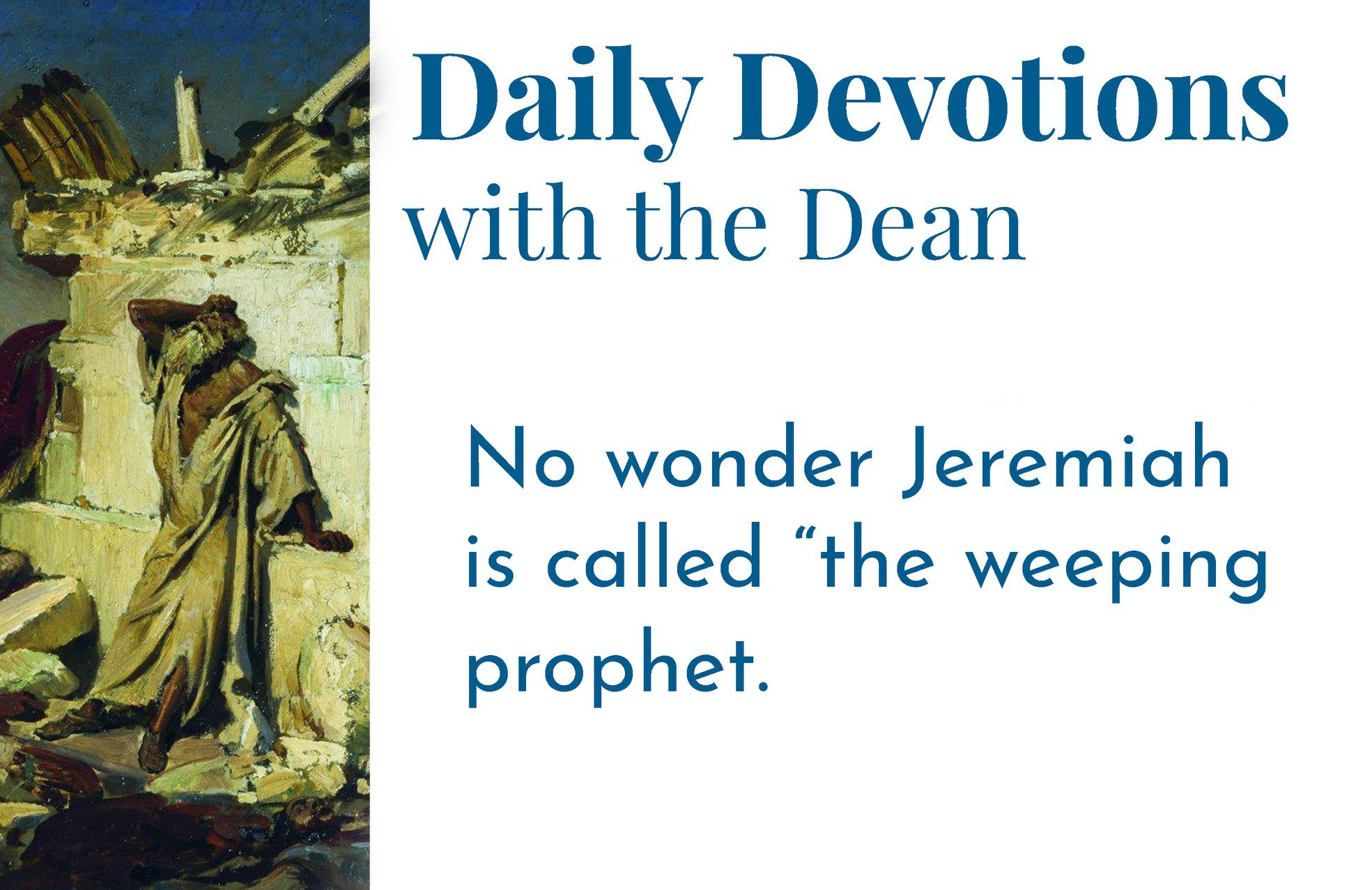Monday • 4/14/2025 •
Holy Week
This morning’s Scriptures are: Psalm 51:1–18(19–20); Jeremiah 12:1–16; Philippians 3:1-14; John 12:9–19
This morning’s Canticles are: following the OT reading, Canticle 9 (“The First Song of Isaiah,” Isaiah 12:2–6, BCP, p. 86); following the Epistle reading, Canticle 19 (“The Song of the Redeemed,” Revelation 15:3–4, BCP, p. 94)
Welcome to Daily Office Devotions, where every Monday through Friday we explore that day’s Scripture readings, as given in the Book of Common Prayer. I’m Reggie Kidd. Thanks for joining me. This is Monday of Holy Week, and we are in Year 1 of the Daily Office Lectionary.
Jeremiah’s life and ministry plunge us into a vortex of confusion. Guilty people prosper. “The beloved of [God’s[ own heart” are given over “into the hands of her enemies.” God forsakes his own house. God’s “pleasant portion” is made into “a desolate wilderness” (Jeremiah 12:1,7,10). No wonder Jeremiah is called “the weeping prophet.” No wonder portraits envision him looking out over a barren and depressing landscape.
And still, for Jeremiah, God’s promises stand: “I will again have compassion on them, and I will bring them again to their heritage, and to their land, every one of them.” (Jeremiah 12:15).
Philippians. Paul’s life and ministry confront us with the existential discovery that all our credentials are worthless skubala (the Greek language’s own “s” word for excrement!—Philippians 3:8). Pedigree, education, exactness in theology, correctness and righteousness of political and ethical cause (Philippians 3:4–8)—all of it, as Jesus says in another context, is like “whatever goes into the mouth, enters the stomach, and then passes into the latrine” (Matthew 15:17 New American Bible). According to Paul, it’s all a bunch of skubala!
Paul can muster up raw self-renunciation like this because the loss of these markers of identity and importance have, for him, yielded to “the surpassing value of knowing Christ Jesus my Lord” (Philippians 3:8). Paul realizes there is no “righteousness of my own” that can be established, buttressed, or maintained by all the credentialing in the world (Philippians 3:9). Instead, Paul discovers, to his wondrous amazement, that there is a credentialing “that comes by way of Christ’s faithfulness—a righteousness from God that is in fact based on Christ’s faithfulness” (Philippians 3:9 New English Translation).
John. May we appreciate that first Palm Sunday for what it is: the humble King presents himself for his Passion. God’s own dear Son rides into Jerusalem, where he will bring down on himself all the desolation we deserve at the hand of God, and all the rejection. Our pretense to self-credentialing merits God’s rejection, which Jesus will experience in our place. Out of sheer love, he comes to endure, on our behalf, the skubala-storm of God’s wrath against sin. By Jesus’s Passion, desolation becomes heritage, wrath becomes joy, and self-pride is replaced by a grateful “pressing on toward the prize of the heavenly call” (Philippians 3:14).
Collect for Monday in Holy Week. Almighty God, whose most dear Son went not up to joy but first he suffered pain, and entered not into glory before he was crucified: Mercifully grant that we, walking in the way of the cross, may find it none other than the way of life and peace; through Jesus Christ your Son our Lord, who lives and reigns with you and the Holy Spirit, one God, for ever and ever. Amen.
Be blessed this day,
Reggie Kidd+













